- Home
- Nancy Mitford
Wigs on the Green Page 2
Wigs on the Green Read online
Page 2
The article was taken seriously by Edgell Rickword, the Communist founding editor of Left Review, who described it in that journal as ‘a very well-developed case of leaderolatry’. But Unity was not deceived and realised that Nancy was parodying Mosley at his most messianic. ‘I’m furious about it,’ she wrote to her, ‘You might have a little thought for poor me, all the boys know that you’re my sister you know.’ In the same letter, she struck a cautioning note about Wigs on the Green, ‘Now seriously, about that book. I have heard a bit about it from Muv [Lady Redesdale], & I warn you you can’t possibly publish it, so you’d better not waste any more time on it. Because if you did publish it I couldn’t possibly ever speak to you again.’
Unity’s reaction on reading the novel is not recorded. Shortly after its publication, she admitted to Diana that she had not yet read it but that Nancy had written to assure her that she wouldn’t mind it, in fact that she would ‘positively like it’, adding, ‘she [Nancy] does have quaint ideas.’ Perhaps when Unity eventually came to read the book she found her portrait as a beautiful blonde goddess sufficiently gratifying to take the sting out of Nancy’s teases. Certainly the few surviving letters exchanged between the sisters after publication are in the same light-hearted tone as before, with Nancy addressing her sister affectionately as ‘Head of Bone and Heart of Stone’, and joshing her with a poem in mock German.
When Nancy was writing Wigs on the Green, Unity had not yet met Hitler, his policies had not yet resulted in systematic genocide and it was still possible – by turning a blind eye to the nature of the regime – to believe that National Socialism could regenerate Germany and usher in an era of peace in Europe. Unity was an impressionable nineteen-year-old when she accompanied Diana to the 1933 Nuremberg Parteitag and came under the spell of Nazism, and just twenty-five when Britain declared war on Germany. Unable to face a conflict between the two countries she loved, she went to a public garden in Munich and put a pistol to her head. The bullet failed to kill her but left her brain-damaged and she died of meningitis nine years later. During the five years she spent in Germany, Unity came to know Hitler personally and embraced the Nazi creed whole-heartedly, including its most virulent anti-Semitism. Nazism, as she wrote to a cousin, ‘is my religion, not merely my political party’.
The dark side of Unity’s character is plain enough to see: ruthlessness, naïveté and a love of showing off, combined with an attraction to violence and a desire to shock, produced moral blindness of an extreme kind. More difficult to understand is what so endeared her to those who loved her, which her family and friends did, however much they deplored her politics. The bond between the Mitford sisters was strong but it did not stop Jessica from cutting Diana out of her life when politics drove them apart; yet she never broke off relations with Unity, even though they took opposite political sides. ‘So what was lovable about her?’ Jessica wrote to Unity’s biographer, ‘and why did I adore her, which I really did … There is a dimension, or facet, of her character missing in your book; but what is it, exactly? … Well she was so ’uge and obdgeg-joinable,2 such a joke, after Wigs on the Green partly a Nancy-created joke – and she [Unity] saw the joke of herself.’ Diana described her as ‘intelligent and affectionate’ and her funeral as the saddest day of her life. To Deborah, the youngest sister, she was, ‘funny and loyal and brave’. Lady Redesdale, who assumed the demanding task of caring for her daughter after her suicide attempt, wrote after her death, ‘I shall miss her always, she was a most rare character.’
In Wigs on the Green, the riddle that was Unity is seen through her eldest sister’s distinctive lens. Nancy paints a caricature of an already larger-than-life young woman, under-educated, overprotected and wilful, who takes up politics to fill the void of boredom that is her life. The adolescent aspects of the Jackshirt movement – belonging to a gang, dressing-up in uniform and devotion to a leader – appeal to her strongly; just as the emotional charge of Fascism did to the youth of the 1930s. ‘When you find schoolgirls like Eugenia going mad about something,’ one of the characters declares, ‘you can be pretty sure that it is nonsense.’ Nancy, like many others at the time, underestimated the lethal consequences of the ‘nonsense’.
The novel is Nancy’s attempt to make sense of a phenomenon that would ultimately tear Europe and her family apart. When you add to this some vintage Mitfordian jokes and teases (and in Peersmont, the lunatic asylum for batty peers, one of her best conceits) it becomes a very fascinating book indeed. However understandable her objections were to its re-publication three quarters of a century ago, today Nancy’s fans and all those curious about a particular slice of twentieth-century history will welcome its return.
Charlotte Mosley, daughter-in-law of Nancy Mitford’s sister Diana, is a journalist and editor of several volumes of Mitford family letters.
1 An American mass-market paperback, the only post-war edition of Wigs on the Green, was published in 1976 in a single volume with Nancy’s first novel, Highland Fling (1931).
2 ‘Huge and objectionable’ in Boudledidge, the private language in which Unity and Jessica communicated as children.
1
‘No, I’m sorry,’ said Noel Foster, ‘not sufficiently attractive.’
He said this in unusually firm and final accents, and with a determination which for him was rare he hung up his office telephone receiver. He leant back in his chair. ‘That’s the last time,’ he thought. Never again, except possibly in regard to the heiresses he now intended to pursue, would he finish long and dreary conversations with the words, ‘Not sufficiently attractive.’
Now that he was leaving the office for good he felt himself in no particular hurry to be off. Unlike other Friday evenings he made no dash for the street; on the contrary he sat still and took a long gloating look round that room which for the last two years had been his prison. With the heavenly knowledge that he would never see them again he was able to gaze in perfect detachment at the stained-glass windows (a cheerful amber shade, full of bubbles too, just like champagne), and the old oak furnishing – which made such a perfectly delightful setting for the charms of Miss Clumps the pretty typist, Miss Brisket the plain typist, and Mr Farmer the head clerk. This amiable trio had been his fellow prisoners for the last two years, he most sincerely hoped never to see any of them again. He said goodbye to them cordially enough, however, took his hat and his umbrella, and then, rich and free, he sauntered into the street.
He had not yet had time since good fortune had befallen him to leave his dreary lodging in Ebury Street, and as a matter of habit returned to it now. He then rang up Jasper Aspect. This he did knowing perfectly well that it was a mistake of the first order. Poor young men who have just received notice of agreeable but moderate legacies can do nothing more stupid than to ring up Jasper Aspect. Noel, who had been intimate with Jasper for most of his life, was aware that he was behaving with deplorable indiscretion, nevertheless some irresistible impulse led him to the telephone where the following conversation took place:
‘Hullo Jasper?’
‘My dear old boy, I was just going to ring you up myself.’
‘Oh, what are you doing to-night?’
‘I thought it would be exceedingly agreeable to take a little dinner off you.’
‘All right, I wanted to see you; where shall we dine – how about Boulestins? Meet you there at eight?’
‘Look here, I haven’t got any money, you know.’
‘That’s all right,’ said Noel. He would keep his glorious news until such time as he could see the incredulity and disgust which would no doubt illumine Jasper’s honest countenance when it was broken to him. Jasper now once more proclaimed his inability to pay, was once more reassured and rang off.
‘This is all exceedingly mysterious,’ he said when they met.
‘Why?’ said Noel.
‘Well, my dear old boy, it isn’t every day of the week one can get a free meal off you, let alone an expensive one like this is going to be. Why di
d you choose me for the jolly treat? I find it very puzzling indeed.’
‘Oh! I wanted to see you. I want your advice about one or two things actually, and after all one must eat somewhere, so why not here?’ And fishing for his handkerchief he produced, as though by accident, and replaced with nonchalance, a roll of ten pound notes.
Jasper’s expression did not change however, as Noel had hopefully anticipated that it would. He merely ordered another champagne cocktail. When it came he said, ‘Well, here’s to the Scrubs old boy, hope you’ll find it comfy there, you can come and see me sometimes in between terms, I’m never at all up-stage about my jail-bird friends.’
‘I don’t know what you mean,’ said Noel, coldly.
‘Don’t you? Well it’s fairly obvious that you’ve got the skates on, isn’t it? And I suppose you want me to help you get away with the dough. Now I suggest that we should go fifty-fifty on it, and do a bunk together. That suit you?’
‘No.’
‘First of all you had better tell me frankly if you are wanted. I’ve been wanted in Paris, and not wanted anywhere else, for simply ages, there’s nothing I don’t know on the subject of wanting.’
‘My dear old boy,’ said Noel, comfortably. ‘I’m afraid you’ve got hold of the wrong end of the stick.’
‘But you came to me for advice.’
‘Yes, I did, I thought you might be able to put me in touch with some rich girl who would like to marry me.’
‘That’s a good one I’m bound to say. To begin with, if I was lucky enough to know any rich girls can you see me handing them out to you? And to go on with, I shouldn’t think the girl is born who would like to marry you.’
‘Oh! nonsense, girls will marry anybody. Besides, I’m a pretty attractive chap you know.’
‘Not very. Anyhow, let me tell you something. Courting heiresses is an exceedingly expensive occupation. You didn’t give me time just then to count exactly how much you have managed to extract from the till, but I’m pretty sure it wasn’t enough to finance a racket of that sort. Why, you don’t know what these girls run you in for, nights out, lunches, orchids, weekends to all parts of the Continent, that’s not the beginning, I’ve been through it, I know what I’m talking about. I suppose the worst part of it,’ he went on, warming to his subject, ‘is the early-morning telephoning. The precious little poppet, buried in lace pillows, likes to have a nice long cosy chat between 9 and 10 a.m., she doesn’t realize that you, meanwhile, are shivering half-way up your landlady’s staircase with an old woman scrubbing the linoleum round your feet. And what’s the end of it all? When she marries her Roumanian prince she may remember to ask you to be one of those pretty young gentlemen who leave the guests to find their own pews at weddings. It’s all fearfully dismal I can tell you.’
‘How you do talk,’ said Noel admiringly. ‘Just like a book. I wonder you don’t write one.’
‘I shall, when I’m thirty. Nobody ought to write books before they’re thirty. I hate precocity. Now then, out with it, Noel, how did you get all that cash?’
‘Well, if you really want to know, an aunt of mine has died. She has left me some money.’
‘That’s just an ordinary lie, of course. Legacies never happen to people one knows. It’s like seeing ghosts or winning the Irish Sweep, one never meets the people who have, only people who know people who have. So how much did she leave you?’
‘Three thousand three hundred and fourteen pounds.’
‘Just say that again.’
‘Three thousand three hundred and fourteen pounds.’
‘Did I hear you say three thousand three hundred and fourteen pounds?’
‘You did.’
‘Honest to God?’
‘Honest to God.’
‘D’you think the aunt was in full possession of her faculties when she made that will?’
‘There’s no doubt that she was.’
‘Such a very odd sum. Well now, Noel, my dear old boy, you have my warmest congratulations. And what about the fourteen pounds?’
‘What about them?’
‘Hadn’t it occurred to you that three thousand three hundred pounds rolls off the tongue much easier without that niggly little fourteen tacked on to it. Sounds more really, I should have said – the fourteen rather spoils it. Actually fourteen pounds is the exact sum I owe my landlady by a curious coincidence.’
‘Oh, it is is it?’ said Noel in a voice of boredom. ‘Now shall I tell you what I said to myself when the lawyer rang me up about all this? I said, no cash presents to any of the boys, and that I keep to, so lay off will you?’
‘That was exceedingly sensible of you. So now you intend to devote the whole of this little nest-egg to the pursuit of heiresses?’
‘I should very much like to find a nice girl and marry her, if that’s what you mean.’
‘It’s such a fearful gamble. Much better put the money on a horse and be out of your misery at once.’
‘I’m not in any misery at all. I intend to lead a soft, luxurious life for the next six months or so, at the rate of six thousand six hundred and twenty-eight pounds a year.’
‘And after that a soft uxorious life at an even better rate. I’m bound to say it’s quite a pleasing outlook – only you don’t know any heiresses.’
‘Not at present. I thought perhaps you did.’
‘Pass the brandy, old boy.’
‘In that case,’ said Noel, summoning the waiter. ‘I’ll have my bill, please – in that case I think I shall have to be going. I’ve watched you drinking that very expensive brandy for quite long enough.’
‘Hold on,’ said Jasper in an aggrieved tone of voice, ‘give a chap time to think, I’ve just had an idea – pass the brandy, old boy.’ He helped himself, carelessly splashing the brandy into his glass. ‘The Jolly Roger,’ he said.
‘What Jolly Roger?’
‘It’s a public-house in Chalford where I once stayed when I was shooting the moon. Pretty little place, pretty little barmaid, I remember – Minnie or Winnie or some name like that.’
‘Thanks, I know plenty of pretty little barmaids myself. It’s not what I’m looking for at present. I think I shall have to be going.’
‘Suppose you allow me to finish what I was saying.’
‘I beg your pardon.’
‘About a mile from Chalford village are the lodge gates of Chalford Park, and there lives the girl whom I believe to be England’s largest heiress – Eugenia Malmains. I couldn’t make a pass at her then because she was under the age of consent; it was about four years ago. She must be quite seventeen by now though. Nobody knows anything about her because she lives with her grandparents who are batty – she’s fairly batty herself I believe.’
‘That’s nothing. She couldn’t be battier than the girls one meets about the place in London. I don’t think it sounds worth investigating, but I might go down to the pub for a weekend sometime – where is Chalford?’
‘About ten miles away from Rackenbridge, that’s the station. Best train in the day is the 4.45 from Paddington.’
‘Well, many thanks, old boy. See you before long, I hope.’
‘I hope so. Thank you very much for my good dinner.’
They spoke with nonchalance. Neither, however, was the least deceived as to the other’s intentions, nor was Noel at all surprised when, arriving at Paddington next day to catch the 11.50 to Rackenbridge, he saw Jasper waiting for him on the platform.
Sadly he lent the requisite pound for Jasper’s ticket, drearily he followed him into a first-class luncheon car. Poor young men who have just received notice of agreeable but moderate legacies should know better than to ring up Jasper Aspect.
‘I’ve no one to blame but myself,’ thought Noel, gloomily.
2
‘Britons, awake! Arise! oh, British lion!’ cried Eugenia Malmains in thrilling tones. She stood on an overturned wash-tub on Chalford village green and harangued about a dozen aged yokels. Her straight hair, cut in a
fringe, large, pale-blue eyes, dark skin, well-proportioned limbs and classical features, combined with a certain fanaticism of gesture to give her the aspect of a modern Joan of Arc.
She was dressed in an ill-fitting grey woollen skirt, no stockings, a pair of threadbare plimsolls, and a jumper made apparently out of a Union Jack. Round her waist was a leather belt to which there was attached a large bright dagger.
Noel Foster and Jasper Aspect were taking a short walk round the village waiting for ‘them’ to open. The true amateur of bars, be it noted, is seldom content to drink his beer in his own hotel, where he may have it in comfort at any hour; he is always restlessly awaiting the glorious moment when some other ‘they’ shall be available. This is called pub-crawling, a sport much indulged in by gentlemen of the leisured classes.
Suddenly they came upon the godlike apparition of Eugenia Malmains on her wash-tub. They gasped.
‘That’s the girl we want,’ said Jasper suddenly, ‘that’s Eugenia. I didn’t recognize her at first. I’m bound to say she’s become exceedingly beautiful since I was here, but she’s evidently quite batty just like I told you. Still you can’t have everything in this life. D’you mind if I make a pass at her too, old boy?’
‘Yes I do, you’re not to,’ said Noel peevishly, ‘and anyway shut up. I want to hear what she’s saying.’
‘The Union Jack Movement is a youth movement,’ Eugenia cried passionately, ‘we are tired of the old. We see things through their eyes no longer. We see nothing admirable in that debating society of aged and corrupt men called Parliament which muddles our great Empire into wars or treaties, dropping one by one the jewels from its crown, casting away its glorious Colonies, its hitherto undenied supremacy at sea, its prestige abroad, its prosperity at home, and all according to each vacillating whim of some octogenarian statesman’s mistress —’

 The Blessing
The Blessing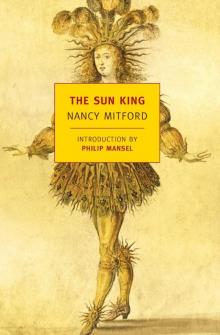 The Sun King
The Sun King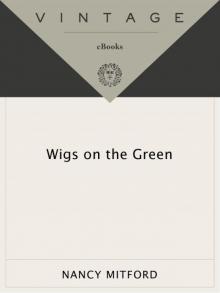 Wigs on the Green
Wigs on the Green Love in a Cold Climate
Love in a Cold Climate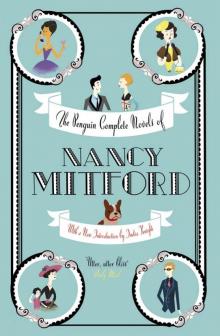 The Penguin Complete Novels of Nancy Mitford
The Penguin Complete Novels of Nancy Mitford The Pursuit of Love
The Pursuit of Love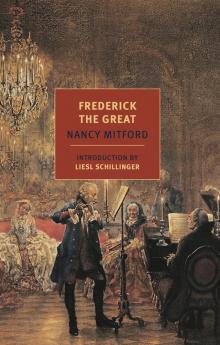 Frederick the Great
Frederick the Great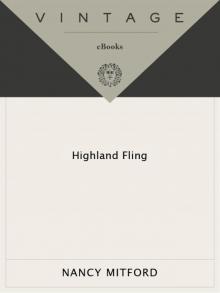 Highland Fling
Highland Fling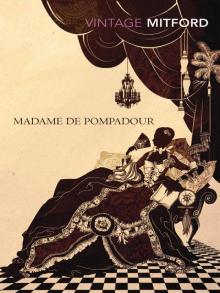 Madame de Pompadour
Madame de Pompadour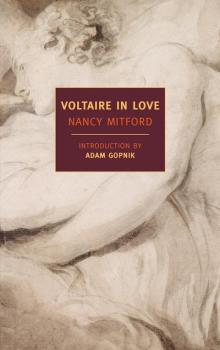 Voltaire in Love
Voltaire in Love Don't Tell Alfred
Don't Tell Alfred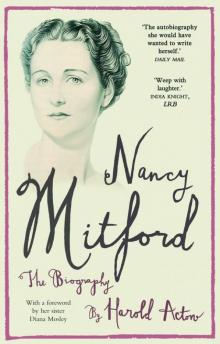 Nancy Mitford
Nancy Mitford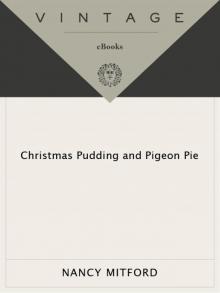 Christmas Pudding and Pigeon Pie
Christmas Pudding and Pigeon Pie